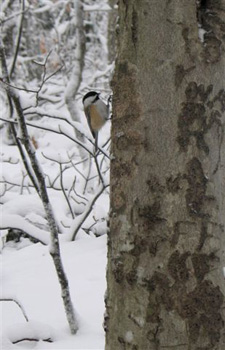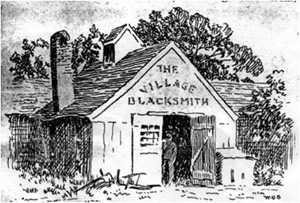Church Censure:
Discipline and Reconciliation
 Hebrews 12:5 — ‘My son, do not make light of the Lord’s discipline, and do not lose heart when he rebukes you, because the Lord disciplines those he loves, and he punishes everyone he accepts as a son.’
Hebrews 12:5 — ‘My son, do not make light of the Lord’s discipline, and do not lose heart when he rebukes you, because the Lord disciplines those he loves, and he punishes everyone he accepts as a son.’
Luke 17: 3 — ‘So watch yourselves. If your brother sins, rebuke him, and if he repent, forgive him.’
First Church Covenant — ‘Wee...doe hereby solemnly, and religiously...Promisse, and bind our selves, to walke in all our wayes according to the Rule of the Gospell, and in all sincere Conformity to His holy Ordinaunces...’
Anne Bradstreet — ‘Sin and shame ever goe together. He that would be freed from the last, must be sure to shun the company of the first.’
Regular attendance at church gatherings was an expected minimum for Bay Colonists. Beyond this, living a ‘godly life’ was the scriptural presumption. Should a ‘Visible Saint’ stray from the ‘straight and narrow path’ of ‘Gospell Rule,’ or violate the ‘law of the commandments,’ it was the duty of each Church member to counsel the transgressor. If no change took place, there was the likely intervention of the entire congregation in a quasi-ecclesiastical court, resulting in a public display of censure, or church discipline. The process was widely known and accepted. It set standards for public life and responsibility in the early Colony.

While this practice may appear contradictory to the gospel of love and the expression of mutual respect, peace and harmony in the community were essential to its prosperity and growth, even the survival of the Mass Bay ‘errand in the Wilderness.’
Disciplinary cases were heard in the Meeting House following the afternoon Sabbath service. Usually, the Teaching, Preaching and Ruling Elders heard evidence from members. It was the duty of the ‘Ruling Elder’ to prepare the disciplinary charge, to define the specific sin, or the breaking of the moral code. After the trial, it was his duty to pronounce sentence ‘according to the mind of Christ.’ The Congregation, as a body, formed the jury of this ‘ecclesiastical court.’ The object of the ‘trial’ was to examine the nature and seriousness of the charge, and to prove or disprove its truthfulness. Thee would be a presentation by witnesses against the accused and a rebuttal by the accused. Thevote, by the congregation, was taken in a ‘show of hands,’ ‘with joynt consent,’ ‘in silence,’ or simply ‘by a vote.’ If a convincing presentation was achieved, the vote would usually be unanimous. This later changed to 'majority rule.'

Church records show three levels of sentence. To be Admonished is similar to a scolding. To be Cast out of the Church would mandate a temporary exclusion from attendance or communion, or more severely, a permanent separation from the community, for one who is a persistent troublemaker. The most extreme term, Excommunication, can signify permanent banishment from the Colony. This sentence, however, could also be levelled on cases of ‘idle or slovenly living.’ The severity of the sentence could be conditioned by the ‘stance’ of the accused.
The following cases of censure from the records of the ‘Old’ Church afford us an insight into the manner of dealing with those who caused disruption to or flouted the morals of the community.
 TheTrial
TheTrial
1) ‘Robert Parker, Servant to Willyam Aspinall,’ was ‘Admitted to the Church on March 9, 1634.’ On December 10, 1635, Parker was ‘...excommunicate for oppression of his wife’s children and hard usage both of her and them.’
2) ‘Richard Wayte, taylor, was ‘Admitted August 28, 1634.’On January 13, 1639, ‘having purloyned buckskyn lether...without harkening to Convincings according to the Rule [of the Gospel: ‘thou shalt not steal’], was, with Joynt Consent of the Congregation Cast out of the Church.’
3) ‘John Webb, a ‘singleman’...on December 15, 1639...was Admonished for sinfully absenting himself from the Congregation upon a Day of Humiliation, and for taking liberty to sportings and vaine Company on the same Day.’ [‘Remember the Sabbath day, to keep it holy.’]
4) ‘March 5th, 1640, Our brother Captaine John Underhill was in Publique Congregaçion by our Pastor in the Name of the Lord and of the Church excommunicated for Comitting Adultery with the wife of one Joseph Febar, a Cooper, and also for Attempting the like with one Jane Howmes the wife of Robert Howmes of Cambridge, a husbandman — As allsoe for Revyling the Governor and other of the Magistrates, — threatning Revenge and Destruction to the Country, and writing slaunderous lies to the State of England for that end; All which the said Captaine Underhill Confessed, but not in such measure of humiliation, as might satisfye the Church, in the trueth of his Repentance, answerable to his Crymes; his Confessions being mingled with sundry Causelesse self Justifyings, and some falshood as saying he never abused the Scripture to draw on any to sinne, whereas it was proved that he had intised some to folly or lewdnesse upon pretence to knock them off from their owne Righteousnesse, as the afforsaid Jane Howmes, to whom he had Confessed that so he knockt off the said Febars wife from her own Righteousnesse.’
5) On March 8, 1640, ‘...our sistar Temperance Sweete the wife of one John Sweete was by our pastor (in the Name of the Lord and with the Consent of the Church taken by their silence [silent vote] Admonisht for having received into house and given entertainment unto disorderly Company and ministring unto them wine and strong waters even unto Drunkennesse and that not without some iniquity both in the measure and pryce thereof.’
Today, we may well see this as a harsh punishment for those who stray out of line, or fall from grace or the ‘straight and narrow path.’ Such a view fails to follow these cases to their desired end. Censure is a way to point out to the individual where they have gone wrong, and what they must do to redeem themselves. The operative phrase, ‘reconciled to the Church,’ is indeed the desired end of the whole exercise. Our fault is to measure these cases by our times, not theirs. Their greatest joy was to have the sinner make a confession and to ask for redemption, that the ‘Prodigal Son’ or daughter humbly ask for forgiveness, and promise to return to righteous ways. Thus would they be welcomed back into the arms of the church-community, to become reconciled both to God and man.
 The Reconciliation
The Reconciliation
1) ‘On March 22, 1638, Robert Parker...on profession of repentance [was] received againe into the fellowship.’
2) ‘On May 3, 1640...upon his pœnitentiall acknowledgement, Richard Wayte is Received againe into the Fellowship of the Church.’
3) ‘Our brother John Webb upon his penitentiall acknowledgment openly Confessing his sinne...was received into their fellowship againe on the 24th day of September, 1645.’
4) On September 3, 1640, ‘Whereas; our brother Captaine John Underhill on the 5th day of the 1st Moneth 1640 was Cast out of the Church for diverse Scandalls he had fallen into, He is this day upon his publique penitentiall acknowledgment of them all Received againe into the Fellowship of the Church.’
5) April 5, 1640, ‘Whereas our sister Temperance Sweete was...Admonisht...but hath now by the Grace of God penetentially made open acknowledgment of her sinfullnesse therein She is become Reconciled to the Church.’
Epilogue
Seeing the Colonial experience as a whole, the ‘church discipline’ sequence reflects a process in which the sinner receives a timely and sober warning, but always in the context that the charge is a firm reminder of some error of one’s ways, and that the desired outcome is to repent, and to be welcomed back into the community with peace and love.
Sources and further reading:
First Church Boston Records (1961), Cooper, Jr. (1998). 